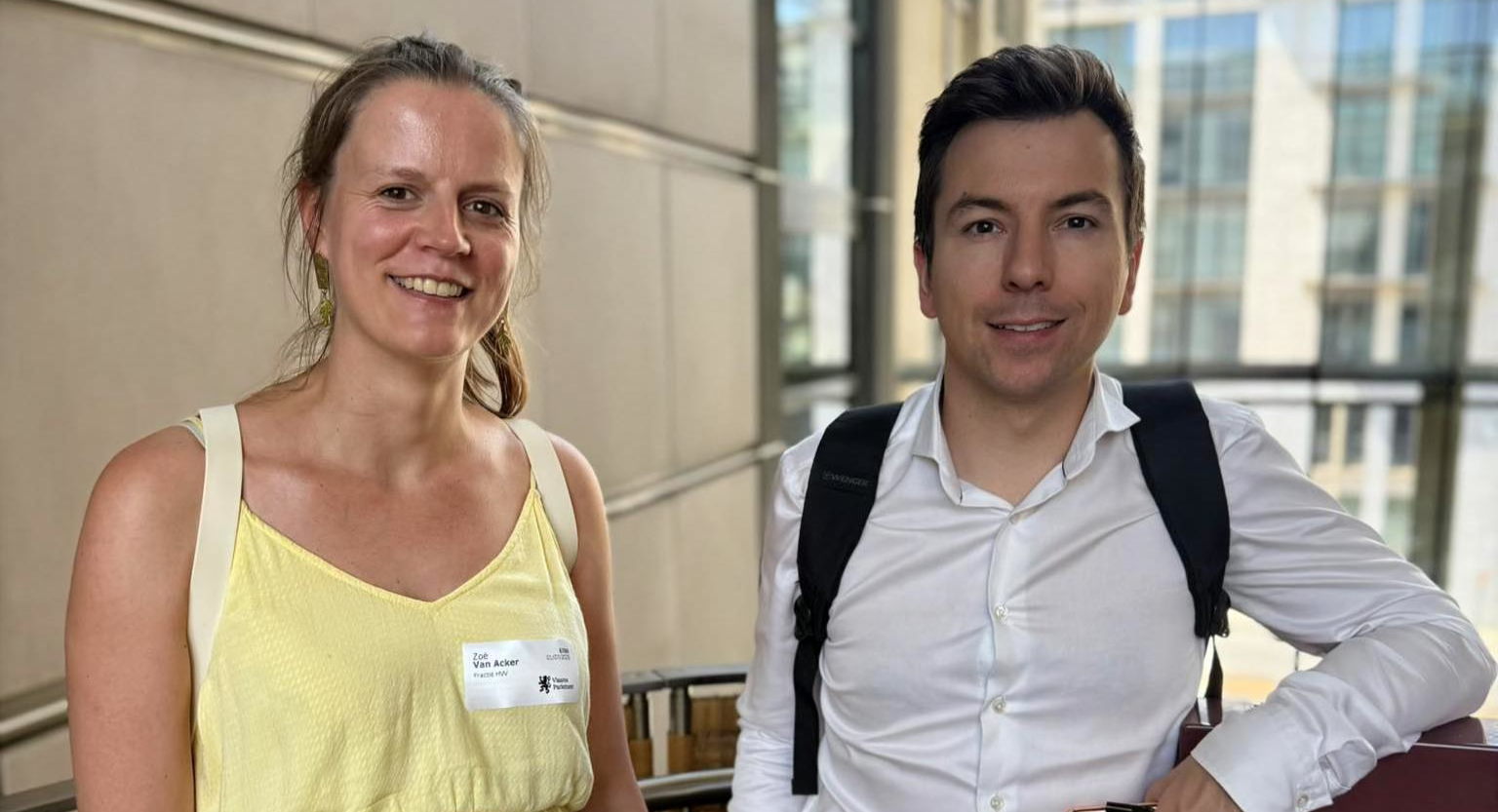When scientists and politicians meet: The researcher’s perspective
Let’s talk with Zoë Van Acker, who participated in the Science Meets Parliament Program and got paired up with politician Toon Vandeurzen
As part of the Science Meets Parliament program (sciencemeetsparliament.be), scientists from Flemish research institutions are paired with policymakers to foster dialogue between research and politics.
In this year’s edition, the pairing brought together Zoë Van Acker, a postdoctoral researcher from the Annaert lab from the VIB-KU Leuven Center for Brain & Disease Research, working in the Alzheimer’s disease field, and Toon Vandeurzen (CD&V, Flemish Parliament, Limburg electoral district), whose policy work spans economy, justice, and welfare.
As part of the Annaert lab, Zoë’s research focuses on how disruptions in endo-lysosomal transport and cellular communication contribute to early stages of Alzheimer’s disease.
For the first part of this program, the collaboration included two parliamentary shadowing sessions in the Flemish Parliament. We asked Zoë about it, before Toon’s visit to her turf.
Hello Zoë! What motivated you to participate in this program?
Science and politics may seem worlds apart, yet they profoundly influence each other. I believe initiatives like Science Meets Parliament are essential because they allow scientists and policymakers to step into each other’s worlds and better understand each other’s perspectives. For scientists, this is particularly valuable. Our work extends far beyond the lab bench. It is shaped by regulations, policy decisions and societal needs, and engaging directly with policymakers helps us see the bigger picture in which our research exists.
As a scientist, how did going to the parliament affect your views on politics?
I believe it was quite interesting to see the process of how legislation is made and how people are really thinking about it and working together. I had the opportunity of following a couple of commissions as well and found there is a lot of interaction with different partners, which I didn't think would be the case as much before I participated in the project.

How was your day at the parliament? Any surprises?
Surprises... I think it was generally interesting to really see it all happening live in front of you. Seeing all the decisions and the communication between people and certainly how fast things needed to go for the plenary discussions. If they had to discuss topic A, they would sometimes only have an hour or two to prepare for it, which is shorter than the prep time I thought they would have. I also attended a healthcare committee session, which was a very different experience from the plenary. The discussions there were slower, with much more in-depth back-and-forth communication, which made it particularly interesting. It was engaging to see how carefully issues were examined and debated, and how directly relevant some of the topics were to both what I’m interested in and what we are doing here in the center.
Based on this program and based on Toon’s visit to happen soon, how do you think that scientists and politicians can work more closely?
I think this is already quite an interesting initiative because you can’t really just go to a politician and tell them, “Hey, I would like to have a conversation with you about science”.
A program like “Science Meets Parliament” is actually making it easier to have a setting in which you are also paired with people with the same kind of interest, like in healthcare or related subjects. And I think it's easier to start from that than just randomly from nowhere.
It's good to have experts in specific fields working together. I think that's delivering the best results to everyone. We don’t always know what it takes to make laws, so bringing different people together is valuable, just like we collaborate here in the center for scientific work, but on a broader scale.
As a result from this program, I think having long-term collaborations or input from one another, might be quite beneficial.

If you could ask politicians to focus more on just one challenge in society, what challenge would you tell them to focus on?
Given I'm working on dementia and Alzheimer’s disease, I would say raising awareness of dementia and the impact on society, but also what research could mean for that. Having this research area on the same level of importance as topics such as cancer would be really great.
Would you like to do this program again? Would you like this to be something that you do on a yearly basis?
I really enjoyed the program and, for that reason, I believe it is important for other researchers to have the opportunity as well. I can wholeheartedly recommend it to everyone. It is a fantastic way to build connections and we have already discussed using these collaborations to increase awareness of Alzheimer’s disease as an underrepresented pathology, for example, by bringing experts through e.g. the SAO-FRA “Stichting Alzheimer Onderzoek –Fondation Recherche Alzheimer” to parliament to share their insights. In Flanders, the number of people with dementia is projected to rise by 24% over the next 10 years and in Limburg by as much as 31%. There is a clear need for more attention to dementia research; both in terms of therapy and social support as well as prevention. I can only look forward to initiatives that address these urgent challenges.
Don’t miss out on Part 2 of this blog series, where we interview Toon Vandeurzen after his visit to our Center!
Want to be kept up-to-date on our biotechnological news and stories? Join our community and subscribe to our bi-monthly newsletter.
João Cardoso



